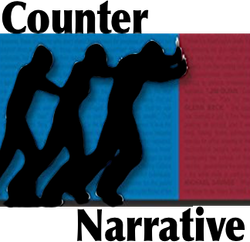

Constructing a narrative is necessary to developing an identity that is resilient, secure, social-emotional competent, empathetic, committed to social justice, and dedicate to family and community growth.
The prevailing narrative, at its best, lacks connections to authentic heritage and experiences to build a health identity for African American students (any person outside of the mainstream and arguably for those within as well). At its worst, the prevailing narrative re-enforces white supremacy and white male manifest destiny, justifies oppression, and promotes a self-hating, deficient and inferior identity for the oppressed; in particular for African Americans.
Those groups outside the mainstream the prevailing narrative is a constant reminder of otherness. While those in the mainstream, the prevailing narrative is so ubiquitous it becomes invisible. Though invisible, it supports and comforts those whose identities are shaped by it.
This is the “core paradox.” How can (why would) a person whose identity is supported/justified by the prevailing narrative be willing/committed to facilitating a counter narrative in which their supremacy is not justified; a narrative undermining American Exceptionalism? The vast majority of American teachers are not capable/do not have the capacity or willing (because of their commitment to the prevailing narrative) to engage African American students with strategies that focus on strengths and excellence, supports a liberated mind and facilitates authentic self-development (i.e. African liberation and excellence, social justice, and Kujichagulia).
As a teacher working with African American students, one must realize “the subversive” nature of "this" pedagogy. Thus, be prepared for the resistance from others.
Black Excellence … the conundrum
Black Excellence is a threat to the prevailing narrative of black inferiority. More specifically, if Black Excellence is possible, then white superiority is not valid. For one to work towards Black Excellence is often seen as radical, militant, and subversive; particularly, when Black excellence is defined with perspectives from an African view point – where “we” seek to find solutions using our cultural heritage and affirms our humanity.
Very presence of Black Excellence (in the spirit of Kujichagulia) undermines the justification white privilege and identity and explanations of black treatment and position in the U.S. (and colonial Africa). Authentic Black Excellence is such a threat, it is necessary to appropriate it. When recognized by “the mainstream,” black excellence is often recognized by fulfilling stereotypical tropes; such as, the athlete or a student who "overcame" their environment (family & neighborhood) - the exception. RARELY, is Black Excellence seen as a product of Black cultural heritage and the normal outcome of its practice.
To be most specific … to embark on a process of transforming/advocating for a "black school" to an excellent school, is to undermine (1) the perception of the black community’s inferiority, and (2) the justification of allocating resources away from the "black school" (and thus the judgment and commitment to justice of those who agreed to the “reallocation”).
The resentment (cognitive dissidence) will be from both black and white. From white folks, those whose identity and subsequent sense of social position (i.e. security) requires black inferiority; best summarized by Lyndon B. Johnson’s statement on “the lowest white man” – “at least I’m not black.” Resentment from black folks comes from those who need black inferiority to be true to justify lost hope and position. If Black Excellence is possible, then one must question why I have not obtain/experience it. It is easier to believe in an overwhelming force (i.e. whiteness) and my inability (i.e. blackness) to overcome it, and settle for my lot in life (believing the white man's ice is colder).
Articles & Resources:
Success in these schools? Visual counter narrative of young men of color.
Reframing Success of High Achieving Black and Latino Males
How to Change the Story about Students of Color
/